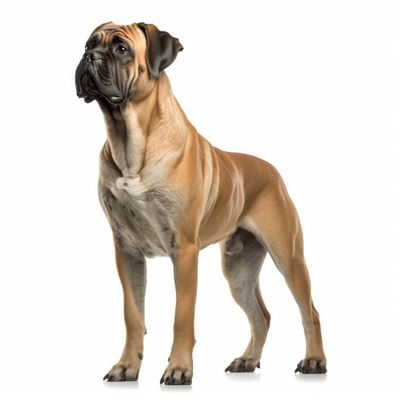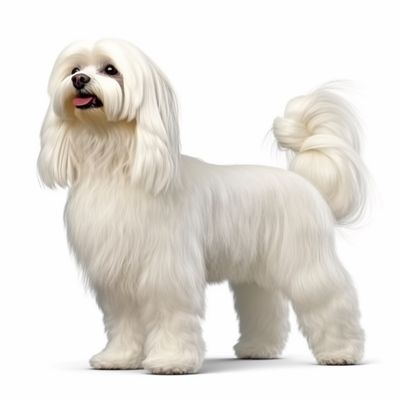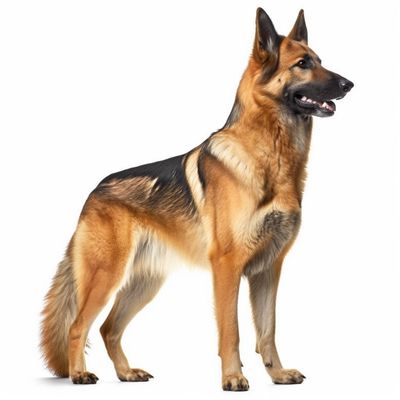Bullmastiff - vs - Maltese - vs - German Shepherd

Bullmastiffs are large dogs, weighing 100-130 lbs, with a height of 24-27 inches.
Bullmastiffs have a low energy level, making them suitable for a more laid-back lifestyle.
Bullmastiffs need regular exercise, such as daily walks and some playtime to keep them healthy.
Bullmastiffs can be trained but may require patience and consistency due to their stubborn nature.
Bullmastiffs are moderately intelligent and can learn basic commands and tricks.
Bullmastiffs can adapt to various living situations but may be better suited to larger homes with outdoor space.
Bullmastiffs are generally good with children, known for their gentle and patient nature.
Bullmastiffs generally get along well with other pets, especially when properly socialized.
Bullmastiffs can tolerate cold climates but should be protected from extreme cold.
Bullmastiffs can tolerate hot climates but need extra care to stay cool and avoid overheating.
Bullmastiffs have a short coat and shed moderately, requiring regular brushing to manage shedding.
Bullmastiffs require minimal grooming, including occasional brushing and bathing to keep their coats clean and healthy.
Bullmastiffs bark occasionally, usually only when necessary or provoked.
Bullmastiffs may have some health issues, requiring regular veterinary checkups and preventative care.

Maltese have a moderate energy level and enjoy short walks and indoor playtime.
Maltese require minimal exercise, with daily walks and playtime indoors being sufficient.
Maltese are moderately easy to train, but they may require patience and consistency.
Maltese are of average intelligence and can learn new commands with proper training.
Maltese are highly adaptable and do well in various living situations, including apartments and houses.
Maltese are generally okay with kids but are better suited for families with older children who understand how to handle small dogs gently.
Maltese can get along well with other pets when properly socialized.
Maltese can tolerate some cold weather but should be protected from extreme cold with appropriate clothing and shelter.
Maltese can tolerate hot climates reasonably well but should always have access to shade and water.
Maltese require regular grooming, including daily brushing and occasional trims, to maintain their long coats.
Maltese have average bark tendencies and may bark for various reasons, such as alerting their owners or during playtime.
Maltese are generally healthy, but regular veterinary checkups and preventative care are still necessary.

German Shepherds are large-sized dogs, weighing 50-90 lbs, with a height of 22-26 inches.
German Shepherds have a high energy level, requiring plenty of exercise and mental stimulation to stay happy and healthy.
German Shepherds need regular and vigorous exercise, including daily walks, runs, and playtime, to keep them fit and content.
German Shepherds are highly intelligent and eager to please, making them easy to train with consistent, positive reinforcement.
German Shepherds are highly intelligent dogs, capable of learning a variety of commands and tasks quickly.
German Shepherds can adapt to different living situations, but they require enough space to move comfortably and regular exercise.
German Shepherds can be good with children due to their protective and affectionate nature, but their size and energy level require supervision and proper handling.
German Shepherds can get along well with other pets, especially when raised together. However, early socialization is important.
German Shepherds can tolerate colder temperatures, thanks to their thick double coat, which provides insulation.
German Shepherds can tolerate hot climates, but they need to be monitored for signs of overheating during exercise.
German Shepherds have a thick double coat and shed heavily, requiring regular brushing to manage shedding and prevent matting.
German Shepherds require regular grooming, including frequent brushing and occasional bathing to keep their coats clean and healthy.
German Shepherds have average bark tendencies and may bark for various reasons, such as alerting their owners or during playtime.
German Shepherds may have some health issues, requiring regular veterinary checkups and preventative care.



